Throughout the history of mankind and across civilizations, nothing could have been accomplished unless the youth of each nation were properly educated. Younger generations need the guidance of those who have come before them to face the challenges of the present and the future. For example, Alexander the Great of Macedonia was taught by one of the best teachers of his time, the Greek philosopher Aristotle. Aristotle taught Alexander about medicine, philosophy, morals, religion, logic, and art. During the early years of his life, Alexander lived by core values imparted by Aristotle. Aristotle made Alexander a man of knowledge, wisdom, character, and principle. Although he is better known for his military successes, Alexander was a role model during his time and will continue to be a significant figure in history for future generations to come.
Before educating students, teachers must first educate themselves on how their own profession has evolved over time so that lessons from history can be passed onto future generations. There have been great teachers that have led mankind to progress. For example, Confucius was the first teacher in China whose mission was to make education broadly available and who made the art of teaching a vocation. Europe can be proud of its ancient Greek thinkers, Roman philosophers, and other prominent figures that have emerged during the Renaissance such as Voltaire and Rousseau. Just as these influential individuals taught new generations the knowledge needed to survive and thrive in the world, the teachers of today have an obligation to young people: a teacher must not only share the principles and wisdom he was taught when he was a student, but he must also try to fill any gaps in knowledge he has encountered himself. Teachers have the power to create the future of our country, inspiring tomorrow’s doctors, lawyers, economists, and politicians.

The role of the teacher has always been the same. To instruct, lead, and inspire the next generation. However, challenges that we face today have radically changed. Young people today face many problems, most of which are not their fault. Poverty, crime, drugs, gun violence, global warming, pandemics, and bullying are phenomena that affect teachers, students, and the community. Society as a whole cannot function without having its constituent parts cooperate with and learn from one another. For example, we cannot have highly trained doctors unless we have excellent medical students, and we cannot have excellent medical students without the guidance of wise, experienced teachers during medical school. This is how society functions. If one part of the body suffers, the whole body is in pain. Social, economic, environmental and political problems affect future generations to come. Nowadays, a teacher has to not only fulfill what her profession requires but must also adapt to constant change in order to best prepare her students to reach their potential.
For example, technological advancements have given us many opportunities for the better, but this is a double-edged sword. Access to the internet and the proliferation of information have changed the teaching profession from what it was decades ago. The teacher is not the only source of information, or the center of the lesson, and has to help students find, explore, and assess the quality of the information needed to learn. Ensuring that the data we have is accurate and factual is of utmost importance. We must instill values and character in our youth, a duty which starts from those that educate and influence the future of our children.
References
The great philosopher Aristotle taught Alexander the Great in Naoussa, Trigiro, The great philosopher Aristoteles taught Alexander the Great in Naoussa
Koeni Carman, Alexander the Great’s Life, Role Model Change Makers, https://www.rolemodelchangemakers.com/home/2018/3/15/alexander-the-greats-life
